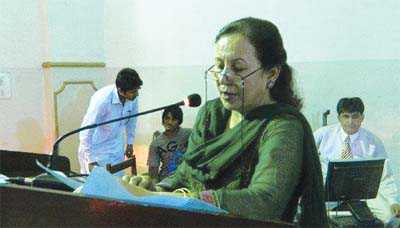‘With the onset of December, the sirens of ambulances ring in my ears again… and my blood boils… I wish I could save her that day… Black December for me starts today,’ Ahmad Qazi wrote on his Facebook page at the start of one of Pakistan’s most depressing months.
Exactly a year ago, a terrorist attack on the Army Public School and College, Peshawar, had killed 144 people, mostly children, besides teachers, administrative staff, watchman and principal Tahira Qazi.
“I try not to give my emotions to the media,” says Ahmad Qazi, her youngest son. His eldest brother, Imran, is a special child and his father, retired Colonel Zafrullah Qazi, too doesn’t speak much about the massacre.
He just wishes that like Malala Yousafzai, the teenager who was shot by the Pakistani Taliban for speaking up for the girls’ education but survived to receive the Nobel Peace Prize, the world would acknowledge Tahira Qazi too for her bravery. The Pakistan government bestowed Sitara-i-Shujaat on Mrs Qazi with to acknowledge her bravery and courage. “Tahira was not only my first cousin, my wife but my best friend,” Col Qazi says.
The couple were often seen in their green Suzuki, buying groceries on Sunday in Golden Arrow Market close to their apartment in the Peshawar cantonment area. The two looked inseparable. Yet, death set them apart in a very brutal way when perhaps Col Qazi, having gone through spinal surgery, needed her most.
Days before the first anniversary of the December 16, 2014 tragedy, the family looked sad yet composed.
There was an uneasy quiet in the small apartment embellished with awards and certificates of Mrs Qazi’s achievements and bravery. Mrs Qazi worked for 20 years at APS. She started as the head of English department when the school was set up in 1994. She grew as the institution grew into a degree college and became its principal in 2006.
Her youngest son Ahmad Qazi, himself an old student of APS, recalls how balanced his mother was in completing home chores and office tasks. She had started to come late when she became principal. “Since 2006, there were threats to the school and her personal security, still Bibi (that’s what he called his mom) made sure each and every child on every single day went home safe.”
Her family believes she could have easily come out when the school was attacked but she remained behind to ensure her students’ safety. Unfortunately, she never made it alive, like many of her students and staff on that fateful day.
“I have been to the school after the incident. It is no more the school I used to go,” says Ahmad, hinting at the walls which have replaced the iron-grill and the academic environment which has been spoiled by the incident.
By arrangement with Dawn
Unlock Exclusive Insights with The Tribune Premium
Take your experience further with Premium access.
Thought-provoking Opinions, Expert Analysis, In-depth Insights and other Member Only Benefits
Already a Member? Sign In Now











